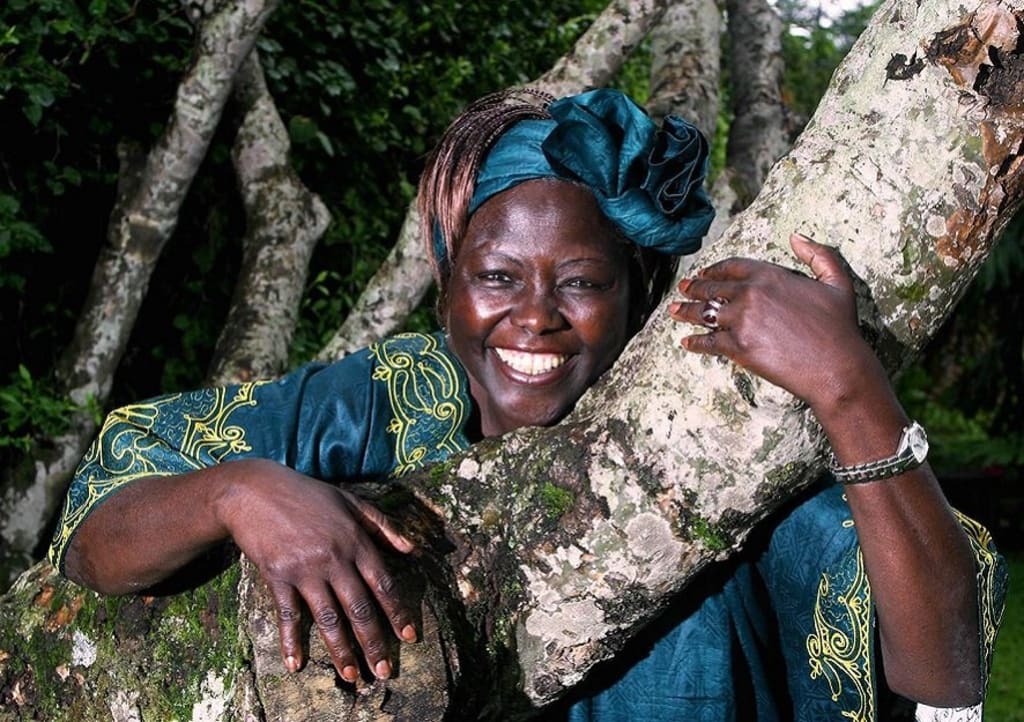
Until 2004, most of the world did not know who she was but for the late Wangari Maathai this was her moment in the limelight to share what she was most passionate about: environmental activism as a Pan-African gateway to freedom. This was the year she became the first African female Nobel Peace Prize laureate for her contribution to sustainable development, democracy and peace. However, for those who followed Wangari’s journey, this award was a moment of recognition but the groundwork she laid was far more important hence why I chose her as a key inspirational woman to celebrate.
Born during the colonial era in Kenya, Wangari’s education was delayed until she was eight but once she was enrolled, she hit the ground running and thus started her records of firsts. After graduating top of her class, she received a scholarship to study in the United States sponsored by John F. Kennedy which was quite a feat for a young woman at the time. Her experience studying in the US and Germany together with her research work in Kenya facilitated her exposure to various elements of environmental restoration which was pivotal in molding her into the leader she became. At this point, Wangari was the first East African woman to receive a PhD which positioned her to be the first female professor in Nairobi, Kenya. She progressed on to be a part of civic organisations that spearheaded agenda such as public health, female empowerment and environmental preservation. Through her engagement with these entities and her husband’s involvement in politics, she realized that the underlying issue with the Kenyan socioeconomic structure was with environmental degradation which birthed her ‘Green Belt Movement’ initiative.
In the famous words of Laurel Thatcher Ulrich, well behaved women rarely make history. This rang true for Wangari as she was bound to ruffle feathers by unapologetically being herself and expressing her truest beliefs. Her rise to power in a lackadaisical and patriarchal society was met with antagonism that strong women would be familiar with. Her ex-husband attempted a smear campaign as they divorced which landed her in jail for fighting back. Her influence was so powerful that there was constant ‘government intervention’ as she attempted to take part in political ventures. She has protested, taken part in hunger strikes and even had armed forces barge into her premises under false claims of treason but through it all she stood firm in her beliefs. Thankfully, she kept doing the hard yards and her work garnered support far and wide.
There’s so much more that she has done even beyond winning the peace prize but I had to share her backstory to lay a foundation to the significance of her presence, especially to the common African woman. One thing I noticed was that she always took pride in her heritage as she would always be dressed in a kitenge, which is an African print attire which would usually be worn on special occasions. Most would consider this unconventional, maybe even an act of defiance for she was one to always face fear and grab it by the horns to show that despite the backlash, she would remain unbowed – which is coincidentally the title of her book. She always made a point to be original and didn't conform to worldly standards but rather made the world her own.
If you were to ask any Kenyan about Wangari Maathai, you would see smiles of absolute joy for the work she did in representing women at the forefront and how we wish we had more leaders like her. We no longer serve the people under the banner of just an African or female role but more of an equal contributors’ role based on merit and grit.
Seven years ago, I packed my bags and left to create a better life for myself in a country that was quite out of my comfort zone and whenever I’m left to my thoughts, she is one of the people whose memories bring me comfort. I think of her, my mother, sister and friends and I can’t help but beam with pride for I am surrounded by a tribe of strong women – even in spirit – that constantly prove that even in a man’s world, our voices count. Moreover, in a world that constantly glorifies Eurocentric contributions, I count myself lucky to have been exposed to African heroines who have made an impact on society and cheered us on to break one glass ceiling after another. Wangari’s life was not in vain and we hope that she remains a guiding light for a better tomorrow.
Viva Wangari, viva!





Comments
There are no comments for this story
Be the first to respond and start the conversation.